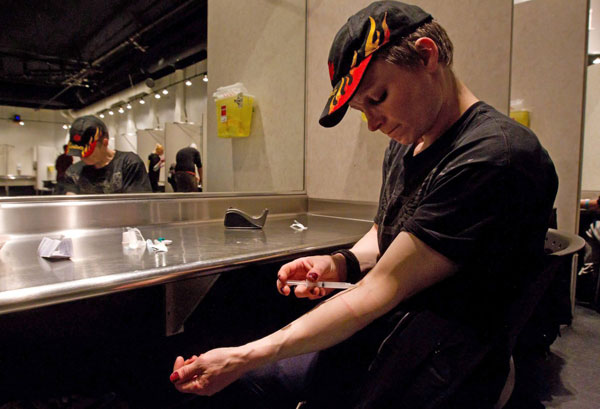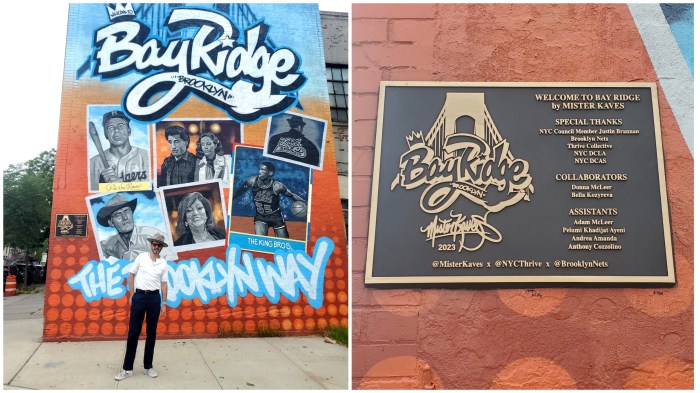Are they high!?
The city is considering opening facilities where heroin users can safely shoot up under medical supervision, but some advocates in areas such as Bay Ridge and Sunset Park — where opiate addiction is raging — say the plan is bonkers and warn that finding locations for the sites will be as fraught as current battles over placement of homeless shelters, which many Brooklynites charge the city opens without proper notification.
“I’m worried if the city moves forward with these facilities that there will be a lack of community notification like with hotels being converted into homeless shelters,” said Bob Capano, who is running for term-limited councilman Vincent Gentile’s Bay Ridge seat next year. “I fear these spaces could be slipped into communities without letting anyone know.”
Locals called the heroin haven idea totally counter-intuitive.
“Are you kidding me? That is absolutely not the solution,” said Rob Serrano, who lives near Owl’s Head Park, where a woman was recently found beaten to death next to a purse with hypodermic needles in it. “How could that possibly help people? That’s just telling me it’s okay to shoot up, you’re literally giving them the space to do that. That’s crazy to me.”
Capano agreed.
“We don’t need clean, nice taxpayer-funded shooting galleries that would decriminalize heroin use,” he said.
The Council allocated $100,000 in September for the Department of Health to study supervised injection facilities — controversial storefronts that provide intravenous drug users clean needles and a place to get high while under medical supervision.
Serrano does not think that having a supervised place to get a fix could have prevented the woman’s death, he said.
“What’s to stop her or anybody else from going to one of these places where they can’t get in trouble for using and then when they’re closed going out and getting high again?” he said.
No such sites exist in the U.S., but 66 cities in other countries, including Canada, have them, according to information from advocacy group Supervised Injection Facilities for a Safer NYC.
A 2014 study in the medical journal “Drug and Alcohol Dependence” surveyed 75 studies exploring the good and bad of supervised injection sites and determined that the services promoted safer injection conditions, enhanced access to primary health care, and reduced the frequency of overdoses. Such facilities did not increase drug injecting, drug trafficking, or crime in the surrounding areas, the study found.
A local drug counsellor who is still on the fence about such sites cautioned against knee-jerk opposition, explaining that they are a better option than letting people shoot up on the street.
“Do I agree with it? The jury is still out on that. But anything that helps people getting off the streets helps us with the heroin epidemic,” said Donna Mae DePola, a recovering addict who runs Resource Training and Counseling Centers in Bay Ridge and Sunset Park. “I wouldn’t want it next to where I live either, but I think a lot of people who are opposed to it don’t really understand it and think we’re encouraging [drug use]. We’re not throwing our hands up in disgust we’re doing harm-reduction.”
The facilities would be more appealing if they were located in hospitals instead of storefronts, as is usually the case, DePola said.
Either way, heroin use has become more public — especially in Bay Ridge, according to Community Board 10 district manager Josephine Beckmann.
“People are starting to see it on the streets more,” she said, citing hypodermic needles found discarded on public streets.
The city’s safe-injection site study is part of a larger effort to curb heroin and opiate abuse, a city spokeswoman said.
“Record numbers of New Yorkers are dying from opioid-related overdoses, and the DeBlasio administration recently funded $5.5 million of new initiatives to address this crisis. We look forward to reviewing the Council’s allocation to conduct a study of this issue,” said health department rep Julien Martinez.
And some say the $100,000 for the study could be better spent on actual treatment.
“I think what has a better chance of savings people’s lives is giving them drug counseling and supportive therapy to help kick the habit,” said Capano.
























